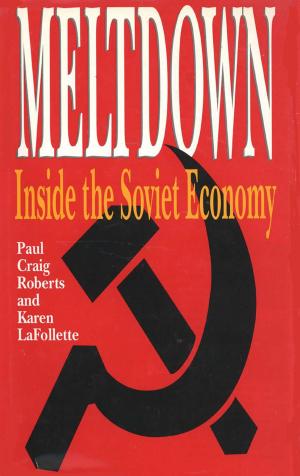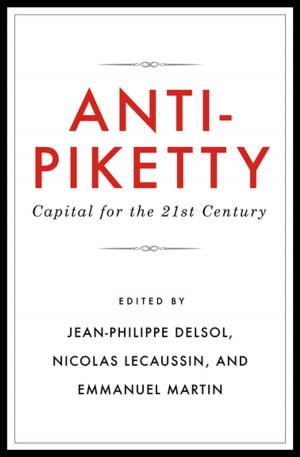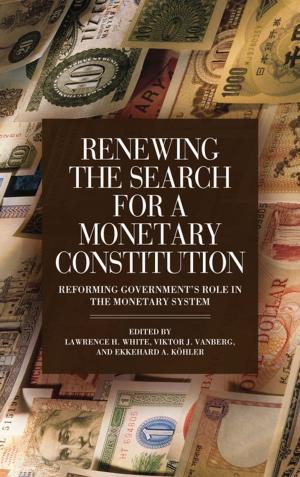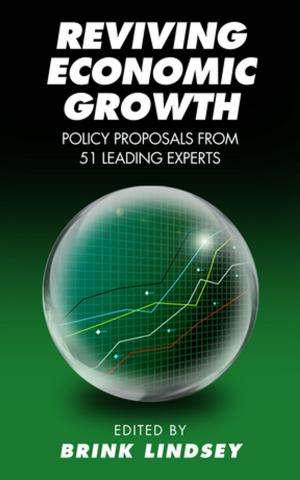The Logic of the Market
An Insider's View of Chinese Economic Reform
Business & Finance, Economics, International Economics, Economic Development, Theory of Economics| Author: | Weiying Zhang | ISBN: | 9781939709615 |
| Publisher: | Cato Institute | Publication: | January 20, 2015 |
| Imprint: | Cato Institute | Language: | English |
| Author: | Weiying Zhang |
| ISBN: | 9781939709615 |
| Publisher: | Cato Institute |
| Publication: | January 20, 2015 |
| Imprint: | Cato Institute |
| Language: | English |
The Logic of the Market by Weiying Zhang—considered China’s “leading market liberal”—comprises his most influential essays on economics over the past three decades. First published in China in 2010, this revised edition contains three new essays, which offer those outside China a deeper understanding of the Chinese economy. “Market competition is a really just competition to create value for others… Only through this approach did the Western economy advance over the past 200 years. It is also the reason for China’s economic marvel over the past 30 years,” writes Weiying. Readers will appreciate Weiying’s ability to address both everyday economic issues and the questions that confront a nation’s leaders, not the least a nation seeking to escape mass poverty.
The economic reforms and subsequent growth in China may be the most astonishing and hopeful event of our age. Weiying was among the leaders who set China on its path of change. Here he elucidates the pitfalls and the progress of economic reform, celebrating leaders who mixed sustained idealism with judicious compromise. Readers seeking to learn from China’s successes will find much of interest here. Weiying emphasizes the importance of entrepreneurs in the new China. He concludes, “The key for China, as the country with the world’s largest population, to return to being the largest economy lies in allowing the entrepreneurial spirit to develop the potential of the domestic market.” For that to happen, Weiying recommends that China continue to reduce the state-owned economy, lessen government control over the economy, and—over the next 30 years—emphasize political reform to build a constitutional democracy.
His thinking is not limited to China. Some of these essays also focus on the global financial crisis—how Keynesian policies can only be effective for the short term and will bring long-term negative consequences. Weiying provides a unique perspective on his country’s market economy, implementation of economic policies, and the potential for Chinese economic development. “I hope that the logic of the market becomes every person’s ideal,” he writes. “That is my reason for writing this book.”
The Logic of the Market by Weiying Zhang—considered China’s “leading market liberal”—comprises his most influential essays on economics over the past three decades. First published in China in 2010, this revised edition contains three new essays, which offer those outside China a deeper understanding of the Chinese economy. “Market competition is a really just competition to create value for others… Only through this approach did the Western economy advance over the past 200 years. It is also the reason for China’s economic marvel over the past 30 years,” writes Weiying. Readers will appreciate Weiying’s ability to address both everyday economic issues and the questions that confront a nation’s leaders, not the least a nation seeking to escape mass poverty.
The economic reforms and subsequent growth in China may be the most astonishing and hopeful event of our age. Weiying was among the leaders who set China on its path of change. Here he elucidates the pitfalls and the progress of economic reform, celebrating leaders who mixed sustained idealism with judicious compromise. Readers seeking to learn from China’s successes will find much of interest here. Weiying emphasizes the importance of entrepreneurs in the new China. He concludes, “The key for China, as the country with the world’s largest population, to return to being the largest economy lies in allowing the entrepreneurial spirit to develop the potential of the domestic market.” For that to happen, Weiying recommends that China continue to reduce the state-owned economy, lessen government control over the economy, and—over the next 30 years—emphasize political reform to build a constitutional democracy.
His thinking is not limited to China. Some of these essays also focus on the global financial crisis—how Keynesian policies can only be effective for the short term and will bring long-term negative consequences. Weiying provides a unique perspective on his country’s market economy, implementation of economic policies, and the potential for Chinese economic development. “I hope that the logic of the market becomes every person’s ideal,” he writes. “That is my reason for writing this book.”















